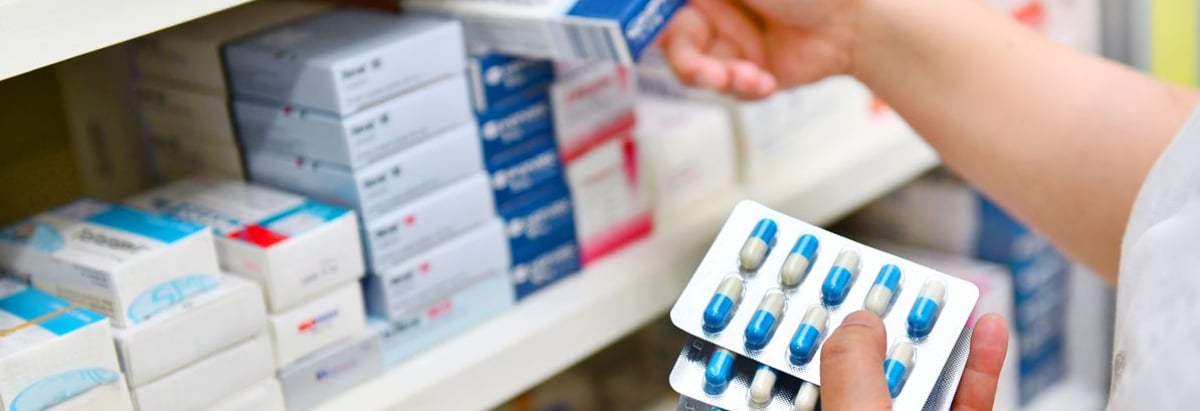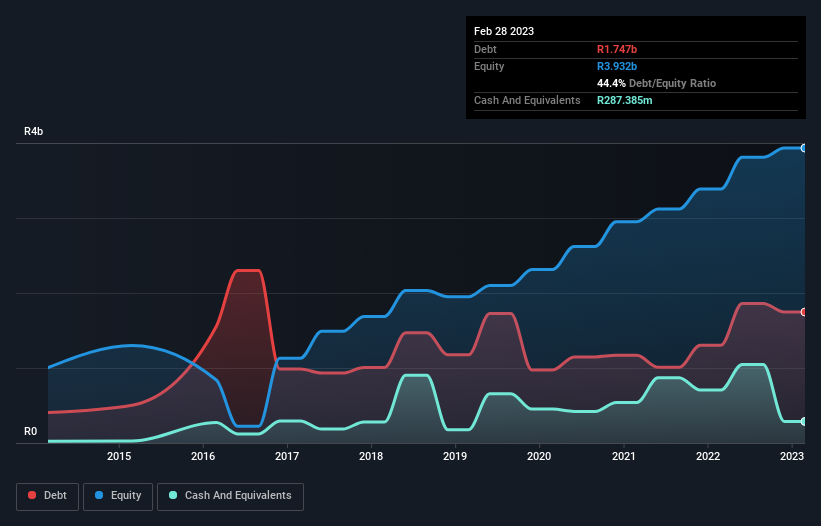- South Africa
- /
- Food and Staples Retail
- /
- JSE:DCP
Here's Why Dis-Chem Pharmacies (JSE:DCP) Can Manage Its Debt Responsibly

Warren Buffett famously said, 'Volatility is far from synonymous with risk.' When we think about how risky a company is, we always like to look at its use of debt, since debt overload can lead to ruin. We can see that Dis-Chem Pharmacies Limited (JSE:DCP) does use debt in its business. But the more important question is: how much risk is that debt creating?
When Is Debt Dangerous?
Debt and other liabilities become risky for a business when it cannot easily fulfill those obligations, either with free cash flow or by raising capital at an attractive price. In the worst case scenario, a company can go bankrupt if it cannot pay its creditors. While that is not too common, we often do see indebted companies permanently diluting shareholders because lenders force them to raise capital at a distressed price. Of course, the upside of debt is that it often represents cheap capital, especially when it replaces dilution in a company with the ability to reinvest at high rates of return. The first step when considering a company's debt levels is to consider its cash and debt together.
View our latest analysis for Dis-Chem Pharmacies
How Much Debt Does Dis-Chem Pharmacies Carry?
As you can see below, at the end of February 2023, Dis-Chem Pharmacies had R1.75b of debt, up from R1.30b a year ago. Click the image for more detail. However, because it has a cash reserve of R287.4m, its net debt is less, at about R1.46b.

How Strong Is Dis-Chem Pharmacies' Balance Sheet?
The latest balance sheet data shows that Dis-Chem Pharmacies had liabilities of R8.35b due within a year, and liabilities of R3.23b falling due after that. Offsetting these obligations, it had cash of R287.4m as well as receivables valued at R2.61b due within 12 months. So it has liabilities totalling R8.68b more than its cash and near-term receivables, combined.
Dis-Chem Pharmacies has a market capitalization of R21.2b, so it could very likely raise cash to ameliorate its balance sheet, if the need arose. But we definitely want to keep our eyes open to indications that its debt is bringing too much risk.
We use two main ratios to inform us about debt levels relative to earnings. The first is net debt divided by earnings before interest, tax, depreciation, and amortization (EBITDA), while the second is how many times its earnings before interest and tax (EBIT) covers its interest expense (or its interest cover, for short). The advantage of this approach is that we take into account both the absolute quantum of debt (with net debt to EBITDA) and the actual interest expenses associated with that debt (with its interest cover ratio).
While Dis-Chem Pharmacies's low debt to EBITDA ratio of 0.70 suggests only modest use of debt, the fact that EBIT only covered the interest expense by 5.0 times last year does give us pause. So we'd recommend keeping a close eye on the impact financing costs are having on the business. If Dis-Chem Pharmacies can keep growing EBIT at last year's rate of 13% over the last year, then it will find its debt load easier to manage. The balance sheet is clearly the area to focus on when you are analysing debt. But it is future earnings, more than anything, that will determine Dis-Chem Pharmacies's ability to maintain a healthy balance sheet going forward. So if you're focused on the future you can check out this free report showing analyst profit forecasts.
But our final consideration is also important, because a company cannot pay debt with paper profits; it needs cold hard cash. So we clearly need to look at whether that EBIT is leading to corresponding free cash flow. Over the most recent three years, Dis-Chem Pharmacies recorded free cash flow worth 53% of its EBIT, which is around normal, given free cash flow excludes interest and tax. This free cash flow puts the company in a good position to pay down debt, when appropriate.
Our View
Both Dis-Chem Pharmacies's ability to handle its debt, based on its EBITDA, and its EBIT growth rate gave us comfort that it can handle its debt. On the other hand, its level of total liabilities makes us a little less comfortable about its debt. Considering this range of data points, we think Dis-Chem Pharmacies is in a good position to manage its debt levels. Having said that, the load is sufficiently heavy that we would recommend any shareholders keep a close eye on it. Of course, we wouldn't say no to the extra confidence that we'd gain if we knew that Dis-Chem Pharmacies insiders have been buying shares: if you're on the same wavelength, you can find out if insiders are buying by clicking this link.
At the end of the day, it's often better to focus on companies that are free from net debt. You can access our special list of such companies (all with a track record of profit growth). It's free.
New: Manage All Your Stock Portfolios in One Place
We've created the ultimate portfolio companion for stock investors, and it's free.
• Connect an unlimited number of Portfolios and see your total in one currency
• Be alerted to new Warning Signs or Risks via email or mobile
• Track the Fair Value of your stocks
Have feedback on this article? Concerned about the content? Get in touch with us directly. Alternatively, email editorial-team (at) simplywallst.com.
This article by Simply Wall St is general in nature. We provide commentary based on historical data and analyst forecasts only using an unbiased methodology and our articles are not intended to be financial advice. It does not constitute a recommendation to buy or sell any stock, and does not take account of your objectives, or your financial situation. We aim to bring you long-term focused analysis driven by fundamental data. Note that our analysis may not factor in the latest price-sensitive company announcements or qualitative material. Simply Wall St has no position in any stocks mentioned.
About JSE:DCP
Dis-Chem Pharmacies
Engages in the retail and wholesale of healthcare products and pharmaceuticals in South Africa.
Outstanding track record with flawless balance sheet.
Similar Companies
Market Insights
Community Narratives




